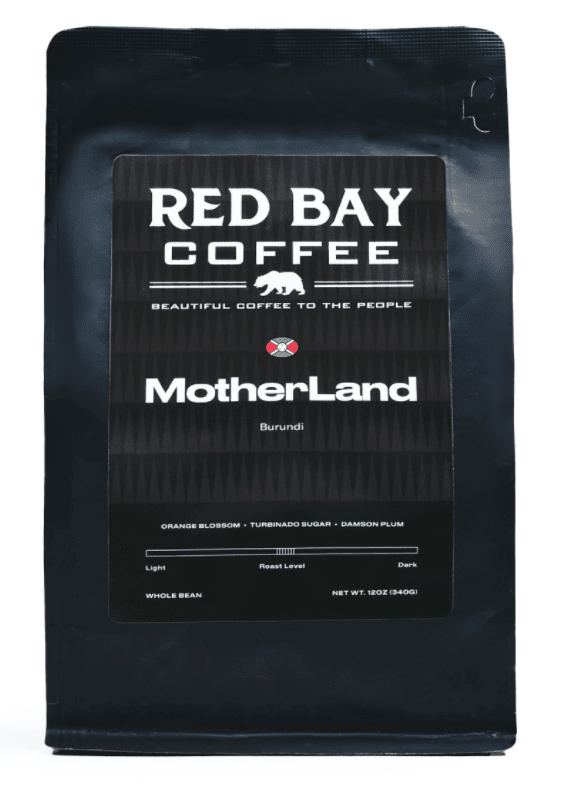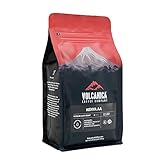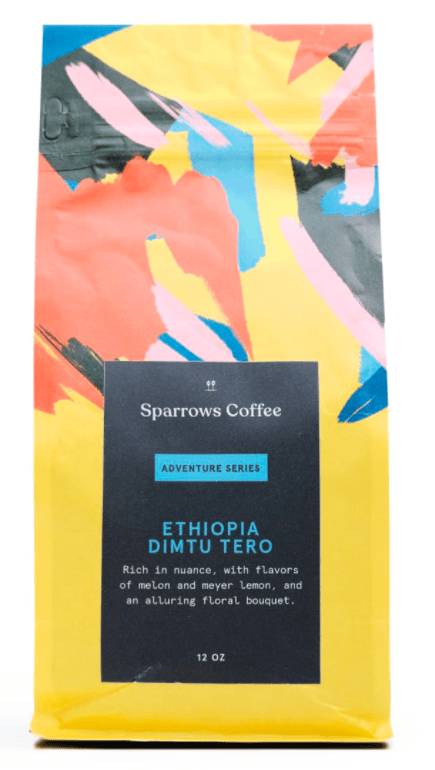Everybody loves coffee from Colombia, Central America, or Indonesia. But the real coffee connoisseurs are all about African coffee.
It is brewed and celebrated all around the world due to its rich and unique flavors that cannot be found anywhere else. Rich soils, perfect coffee harvesting climate, and skilled farmers ensure that the majority of the African coffee beans are the best quality and are classified as specialty grade.
What does it taste like? What are the major as well as the smaller growing regions? And how do they differ?
Let’s talk about this specialty coffee heaven.
At a Glance: African Coffees
What Makes It So Special?
African coffee is known around the globe as one of the most distinctive coffee regions with unique flavors.
The coffee growing and harvesting conditions in Africa are ideal. Volcanic mineral-rich soils, mountainous regions, high altitudes, and proximity to the equator are responsible for the original taste.
African coffees have vivid floral, fruity, and berry tasting notes. It is characterized by the typical bright acidity and winey flavor profile. It is a region where the fruitiest coffees can be found. Citrus, bergamot, berries, or jasmine are the common flavors.
Ethiopia and Kenya are the African countries that have established a coffee legacy that is celebrated all around the world with superior varieties such as Kenya AA or Ethiopian Yirgacheffe. Other regions, such as Rwanda, Tanzania or Burundi, also display unique flavors and get very high specialty coffee grading.
Quick Summary: African Coffees
 | Our Top Pick SPARROWS COFFEE ETHIOPIA DIMTU TERO |
| Check Price → |
 | FRESH ROASTED COFFEE ETHIOPIAN YIRGACHEFFE |
| Check on Amazon → |
 | RED BAY COFFEE MOTHERLAND |
| Check Price → |
 | VOLCANICA KENYA AA COFFEE |
| Check on Amazon → |
 | STONE STREET TANZANIA PEABERRY |
| Check on Amazon → |
 | IKIZERE HOPE RWANDA BEAN |
| Check on Amazon → |
 | FOR FIVE COFFEE ROASTERS BURUNDI |
| Check on Amazon → |
 | KLATCH ORGANIC UGANDA CHEMA SIPI FALLS COFFEE |
| Check on Amazon → |
 | Equal Exchange Organic Congo Project Coffee |
| Check on Amazon → |
The Biggest African Coffee Producers
Ethiopia and Kenya are the largest and most established African coffee origins. We’ll talk about what makes them special and what to expect from your cup.

Ethiopia: Where It All Began
The coffee history in Ethiopia dates back to the very beginning in 850AD. This country is believed to be the birthplace of coffee. The famous legend tells a story of a goat herder Kaldi who discovered the magic bean thanks to his caffeinated goats.
The coffee production in Ethiopia is massive. In 2016, the country produced 384 000 metric tonnes of coffee beans, it involves 15 million people in coffee production and is the 5th biggest coffee producing country in the world. Ethiopian beans are the most popular beans worldwide accounting for 3% of the world’s coffee supply.
The most iconic region that everyone recognizes is the Ethiopian Yirgacheffe coffee variety. It is one of the best Arabica coffee varieties out there. The other ones include Sidamo, Harrar, or Kaffa. The Ethiopian ‘Heirloom‘ is used to describe indigenous heirloom varieties resulting from cross-breeding between species.
The Ethiopian coffee beans that go through the washed process are elegant, complex, and delicious. While the naturally processed beans are more unusual and wildly fruity.
The common tasting notes are floral, herbal, and citrusy. It has a pleasant mild acidity and a medium body. But it can also taste winey, floral and tea-like, depending on the variety.
Sparrows Coffee Ethiopia Dimtu Tero

Sparrows Coffee Ethiopia Dimtu Tero
Soft and silky, and just oh-so-pleasant, this clean cup offers a classic Ethiopian floral profile with just a drop of lemon acidity.
When you’re on the hunt for a quality African coffee, it only makes sense to begin your search in Ethiopia. After all, that’s where our beloved morning drink was born! That’s why Sparrows Coffee’s Dimtu Tero beans ended up on our list of African coffee recommendations.
The medium-roasted beans make a brew that’s light and refreshing — something that reminds us of summertime. But that doesn’t mean you can’t enjoy a cup the rest of the year, too; the floral coffee and its notes of Meyer lemon, jasmine, and melon are the perfect perky pick-me-up on any day that ends in “y.”
Fresh Roasted Coffee Ethiopian Yirgacheffe
Showing off the most popular Yirgacheffe coffee variety, this one is well balanced and mild. The medium roast of this Ethiopian coffee is wash processed, sun-dried, and produced sustainably. The interesting tasting notes include honey and lemon, bringing out the citrusy flavor.
Red Bay Coffee Motherland

Red Bay Coffee Motherland
Round, brown sugary sweetness meets a gentle green apple acidity and subtle hints of florals.
Next up on our list of javas from the Motherland is an offering from Red Bay Coffee…and very appropriately, it’s called the Motherland roast. These beans hail from Burundi, and the medium roast is sweet and floral. You’ll taste hints of orange blossom, turbinado sugar, and damson plum in every slow sip.
We’re specifically recommending this drink to our fellow coffee enthusiasts who are looking for something especially bright to start the day with, but we’re fairly certain pretty much anyone would enjoy this sweet drink.
Kenya: The Highest Grade Beans
Kenyan coffee history is not as long as the Ethiopian one, but its reputation is just as big. It is globally considered as wildly unique and most coffee enthusiasts know exactly what to expect from a cup of Kenya. It is the 16th largest coffee producer in the world with 330 farms that are 15 hectares or bigger.
It is mostly grown at foothills of Mount Kenya with the most favorable coffee climate. It is often grown by small farmers who emphasize quality. The processing and drying are carefully controlled. It grows at 4500-6500 feet altitude in volcanic soils.
This African coffee has its own grading system. The highest grade ‘AA’ beans are large and contain the biggest amount of oils, providing the richest coffee experience. Kenya AA coffee is considered one of the best coffees in the world.
The first thing that comes to mind when describing Kenyan coffee is its sharp fruity acidity that cannot be found anywhere else. This one is brighter than its Ethiopian cousin. This is paired with a rich fragrance, complex aroma as well as fruity, citrusy, and winey tasting notes.
Volcanica Kenya AA Coffee
The Third Wave Volcanica coffee produces a pure 100% Kenya that is the highest in grade. It is rich in body with the typical vibrant acidity, fragrant aroma, taste notes of berries and citrus, flavors that were developed in mineral-rich volcanic soils.
Other Coffee Producing Countries

The interesting African coffee doesn’t stop there. Smaller countries with relatively short coffee history manage to produce some impressive flavors too.
Let’s have a look at coffee production by country in Africa.
Tanzanian Peaberry
Tanzanian Peaberry coffee is grown at Mount Kilimanjaro, which ensures that the region’s soil is favorable for the flavor of the beans. The peaberry coffee is known for having one, smaller, and rounder coffee bean instead of the usual two. The peaberry coffee from this region is bright and complex, with a medium body.
Stone Street Tanzania Peaberry
Showing off the peaberry coffee from this unique perfect conditions of Mount Kilimanjaro ensure berry flavors and a smooth finish. You can expect the qualities of Kenyan coffee but lighter acidity, peaberry variety enhancing the body. The coffee is handcrafted in small batches and roasted in micro-roastery in Brooklyn.
Rwanda
Rwanda is known for producing a bourbon variety of coffee. With less than 20-year coffee history, the fact that 80% of the country’s produce is classified as specialty grade is very impressive. Again, the coffee production conditions are ideal here, with a high elevation of 3000 feet producing dense beans.
The high-temperature roasting is used to avoid an overly acidic profile and maintaining rich mouthfeel. The flavors are distinct, sweet, full-bodied, floral, with notes of red fruit.
Ikizere Hope Rwanda Bean
This coffee is grown and harvested in Rwanda in volcanic soils close to the equator, and 50% of the profit goes back to the farmers. The typical bourbon variety has a medium body, subtle, nutty flavor, without being weak. Expect no acidity and earthy aroma that shows nutmeg undertones and finished on a smooth, satisfying mouthfeel.
Burundi
This African coffee focuses on bourbon variety grown in this mountainous terrain. While the civil war in the 1990s devastated the coffee industry in Burundi, it managed to recover and it receives consistently high scores from specialty coffee graders. This African coffee has a clean taste, sweet berry, and fig flavors wrapped in juicy acidity.
For Five Coffee Roasters Burundi
This light roast shows off the fruity flavors of Burundi coffee, with melon, cherry notes, and winey finish. This African coffee has dynamic flavors, fragrant aroma, and smooth mouthfeel. It is perfect for someone who loves Kenyan coffee and would like to try something new. The freshness of the beans is ensured by roasting it to perfection in New York City.
Uganda
In the past, Uganda was mostly known for producing Robusta coffee beans. Now, however, it’s starting to make the name for itself with high-quality Arabica coffee as well. Some farms sit at a high 7500 feet altitude. The conditions are cooler and produce more complex coffees. This African coffee is rich, with cherry, nutty, and chocolate taste, together with a typical bright winey acidity.
Klatch Organic Uganda Chema Sipi Falls Coffee
This organic shade-grown coffee from Uganda is ideal for filter brewing methods that showcase its unique flavors. Expect hints of white grapes, honeydew but also chocolate, dried plum, and almond undertones.
Congo
This is one of the lesser-known African coffees. It has a unique tasting profile, just like any coffee coming from this continent. Congo is resource-rich but lacks the infrastructure. Expect a pleasant bitterness, chocolatey notes with hints of apple and even cinnamon.
Equal Exchange Organic Congo Project Coffee
Coffee from Congo is not easy to find, but this equal exchange coffee is worth a try. The whole beans have rich chocolate, vanilla, and brown spice flavors together with ginger and fudge notes. The flavors are balanced with a creamy mouthfeel and delicate acidity.
Convinced Yet?
African coffees are known for their unique flavors and distinct taste characteristics. This is mainly because of the ideal growing conditions that make the coffee cherries thrive.
Ethiopia and Kenya have established their coffee legacy and are considered as few of the best coffee regions in the world.
Your interest in African coffee beans shouldn’t stop there though. Lesser-known African countries such as Tanzania, Rwanda, Burundi, or Uganda produce high-quality specialty grade beans that are worth branching out for.
Expand your single-origin horizon and get a taste of these unique regions.
Keep caffeinated!














